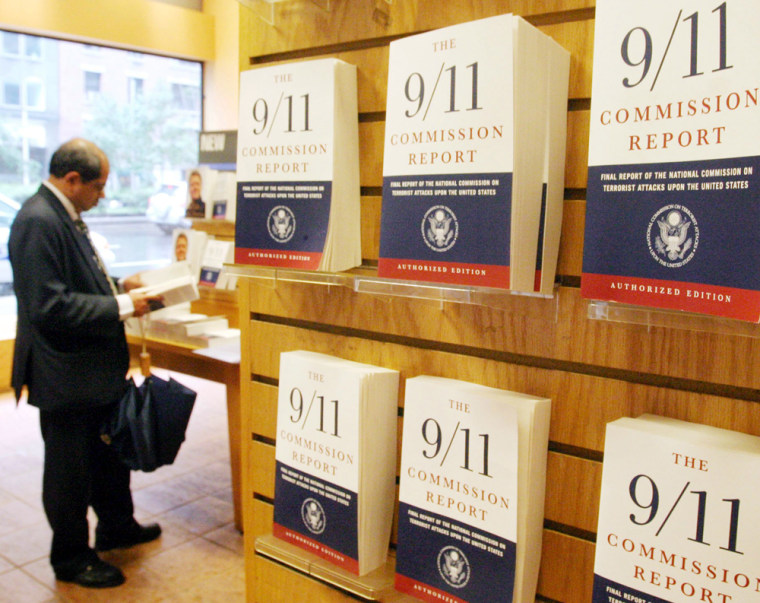Without promising what specific steps he will take, President Bush is committing his administration to relying on the recommendations of the Sept. 11 commission in waging the war on terrorism.
“The danger to America has not passed,” Bush said Saturday in his weekly radio address, citing the cautionary note sounded this week by the commission chairman, Thomas Kean.
The commission’s unanimous report, the culmination of a 20-month investigation, portrayed the Sept. 11 terrorists as creative and determined while the nation they were preparing to strike was unprepared and uncomprehending of the imminent danger.
Legislation that would carry out two of the report’s recommendations will be the focus of an unusual round of hearings in August while Congress is in recess.
“The 9/11 commission’s recommendations will help guide our efforts,” said the president. “We will carefully examine all the commission’s ideas on how we can improve our ongoing efforts to protect America and to prevent another attack.”
Kean, a Republican, has left no doubt what he thinks should be done, saying that unless the panel’s recommendations are implemented swiftly, “we’re more vulnerable to another terrorist attack.”
“We’re in danger of just letting things slide. Time is not on our side,” Kean said.
No timetable set
Bush has not said how quickly the administration will act. Two important administration officials, Homeland Security chief Tom Ridge and acting CIA director John McLaughlin, oppose a Cabinet-level overseer of the intelligence apparatus, saying improving the current structure is what is needed.
White House chief of staff Andrew Card will undertake a Cabinet-level review of the proposals, which will be examined at all levels of government.
Bush insists all recommendations are on the table, while detailing the steps already taken.
He pointed to the dismantling of terrorist cells from California to Florida the removal of regimes in Iraq and Afghanistan.
“We have waged a steady, relentless, determined war,” said the president.
Bush said his administration has provided $13 billion to equip and train more than half a million first responders in cities across the country; transformed the FBI into an agency whose primary mission is fighting terrorism; and stockpiled enough small pox vaccine for every American in case of an emergency.
Lawmakers to break recess
On Friday, key lawmakers announced that the Senate would interrupt its August recess for hearings focused on immediate legislative proposals.
Sens. Susan Collins, R-Maine, chairwoman of the Governmental Affairs Committee, and Joseph Lieberman, D-Conn., whom the Senate leadership designated to head Congress’ action on the commission’s recommendations, told reporters that the goal was to report legislation to the full Senate by Oct. 1.
“Because of the urgency of this task, we will begin work right away, and we will hold the first hearing the first week in August,” Collins said. “So no longer will it be a sleepy quiet August around here.”
Added Lieberman: “How can we go about business as usual when the commission has given us a charter to make America safer?”
Late Friday, House Speaker Dennis Hastert, R-Ill., who had expressed doubt that lawmakers would have time to consider a sweeping intelligence overhaul this year, said he and Majority Leader Tom DeLay, R-Texas, would also direct House committees to hold hearings in August and make recommendations for legislation in September.
“The House plans to immediately assess everything we have done ... since 9/11 and everything more we need to do,” Hastert said.
Collins said the first priorities would be to tackle the recommendations to establish a counterterrorism center and a single intelligence director. The other recommendations in the commission’s report will wait until early next year, she said.
Relatives see ‘difficult struggle’
Families of victims of the Sept. 11, 2001, terrorist attacks, who were credited with forcing the independent inquiry by overcoming initial resistance from the White House, vowed to turn up the pressure to overcome resistance in intelligence agencies and among some members of Congress to the commission’s recommendations.
“It’s going to be a very difficult struggle,” said Steve Push, whose wife, Lisa Raines, died on the plane that struck the Pentagon. “These forces will try to prevent these changes from taking place.”
They will be aided by stark warnings delivered by the commission’s members, including its chairman, former New Jersey Gov. Thomas Kean, a Republican.
“Every expert with whom we spoke told us an attack of even greater magnitude is now possible and even probable,” Kean said Thursday, shortly after delivering the long-awaited report to President Bush.
The commission concluded that the United States could not protect its citizens from the Sept. 11 attacks because it failed to appreciate the threat posed by al-Qaida operatives, who exploited that failure to carry out the deadliest assault ever on U.S. soil.
